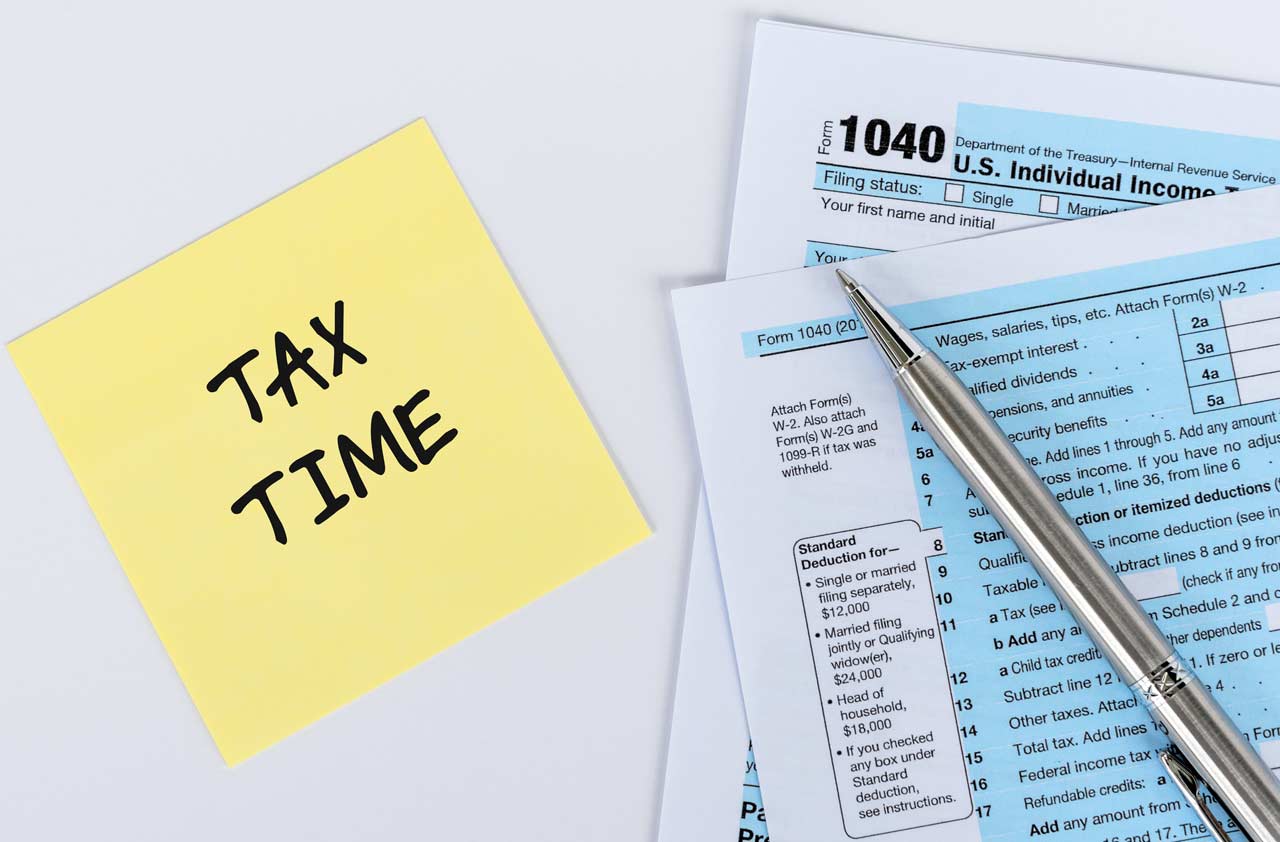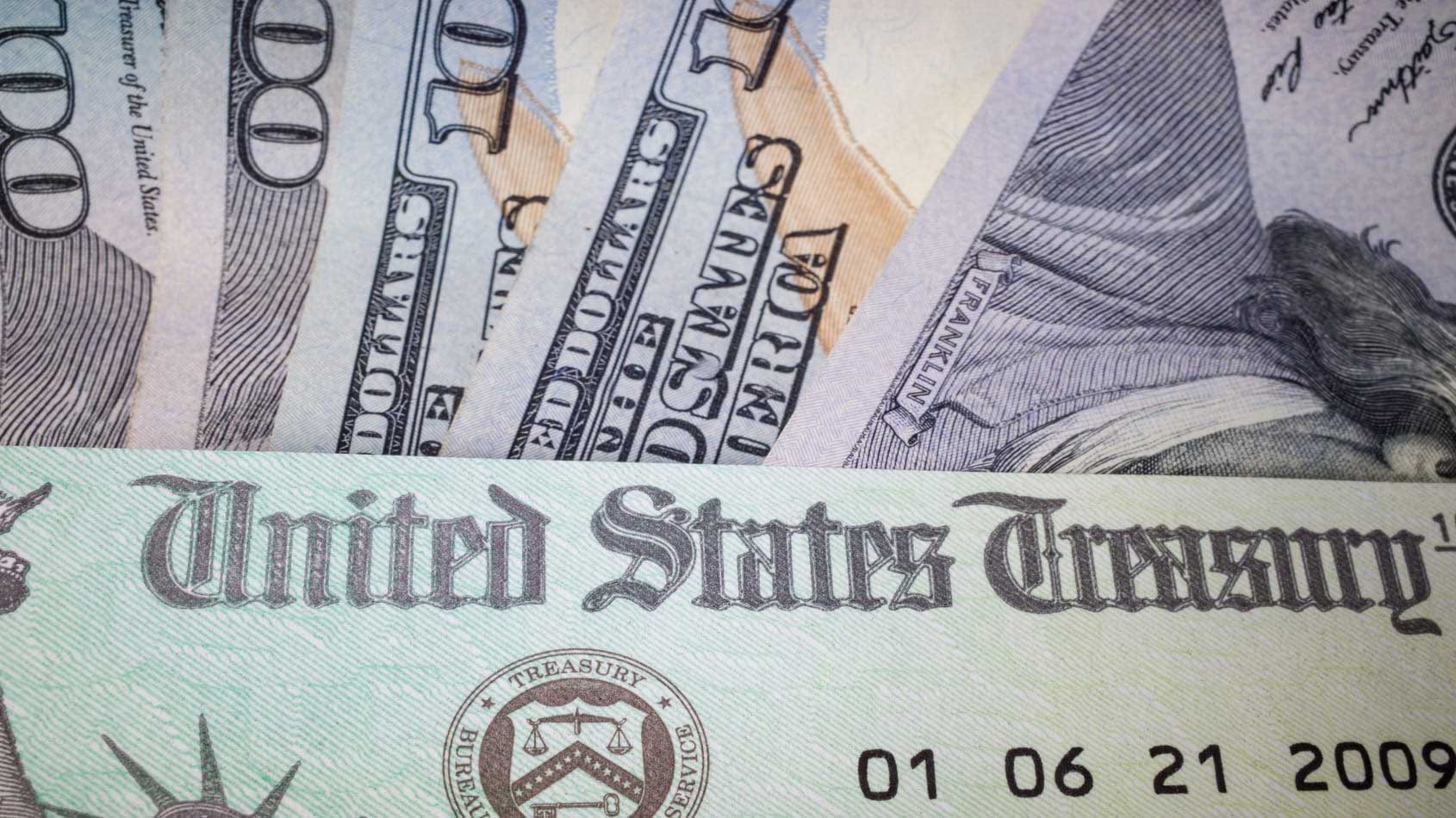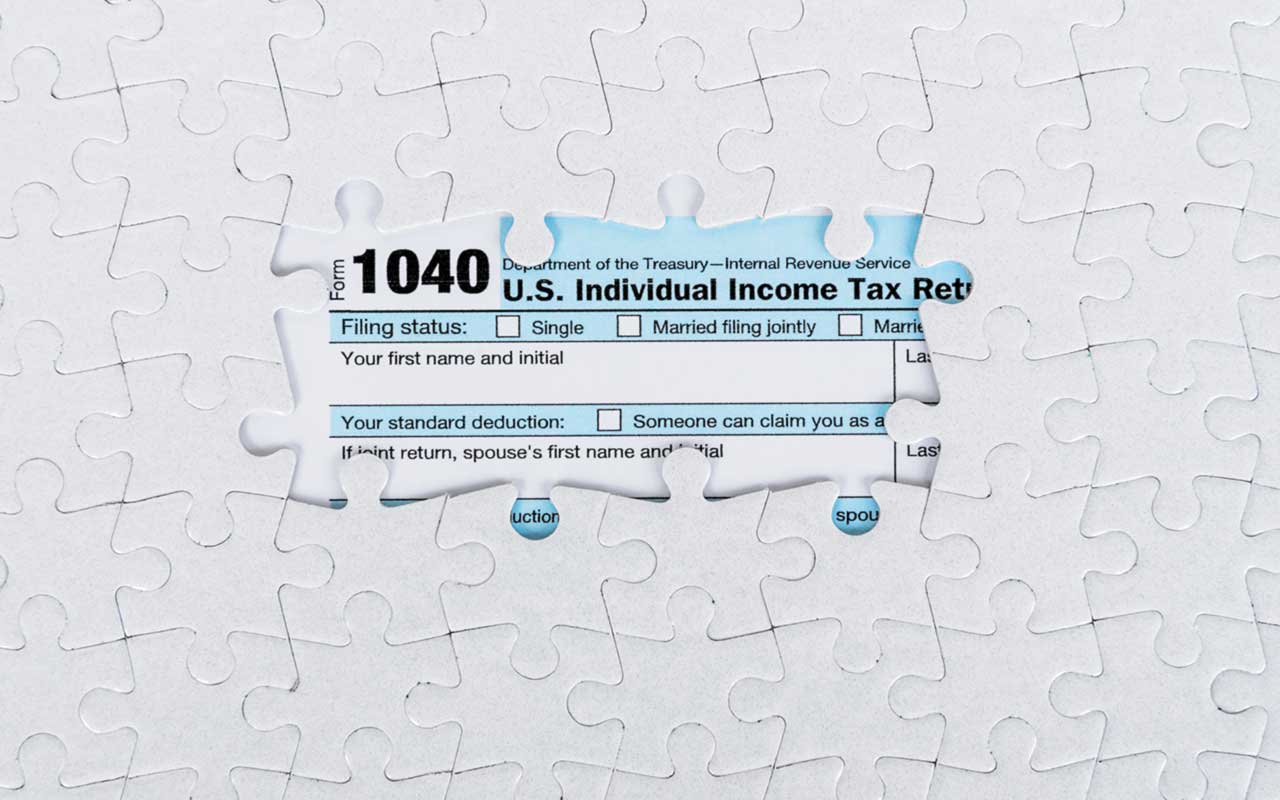Why You Should File Your Taxes Now
Our hosts Sandy Block and Ryan Ermey discuss why you should file your taxes as soon as you get your W-2 form. Also, the pair dish on common nuisance fees and how to avoid them, as well as why renters need to invest in a renters insurance policy.

Profit and prosper with the best of Kiplinger's advice on investing, taxes, retirement, personal finance and much more. Delivered daily. Enter your email in the box and click Sign Me Up.
You are now subscribed
Your newsletter sign-up was successful
Want to add more newsletters?

Delivered daily
Kiplinger Today
Profit and prosper with the best of Kiplinger's advice on investing, taxes, retirement, personal finance and much more delivered daily. Smart money moves start here.

Sent five days a week
Kiplinger A Step Ahead
Get practical help to make better financial decisions in your everyday life, from spending to savings on top deals.

Delivered daily
Kiplinger Closing Bell
Get today's biggest financial and investing headlines delivered to your inbox every day the U.S. stock market is open.

Sent twice a week
Kiplinger Adviser Intel
Financial pros across the country share best practices and fresh tactics to preserve and grow your wealth.

Delivered weekly
Kiplinger Tax Tips
Trim your federal and state tax bills with practical tax-planning and tax-cutting strategies.

Sent twice a week
Kiplinger Retirement Tips
Your twice-a-week guide to planning and enjoying a financially secure and richly rewarding retirement

Sent bimonthly.
Kiplinger Adviser Angle
Insights for advisers, wealth managers and other financial professionals.

Sent twice a week
Kiplinger Investing Weekly
Your twice-a-week roundup of promising stocks, funds, companies and industries you should consider, ones you should avoid, and why.

Sent weekly for six weeks
Kiplinger Invest for Retirement
Your step-by-step six-part series on how to invest for retirement, from devising a successful strategy to exactly which investments to choose.
Ryan Ermey: Have you gotten your W-2 yet? If not, you'll be getting it shortly, which means you should get started on filing your taxes. Why so soon? Sandy tells you all about it in our main segment. On today's podcast, we discuss annoying fees and how to avoid them, and I break down why you should get renter's insurance if you don't already have it.
- Episode Length: 00:27:44
- Links and resources mentioned in this episode
- SUBSCRIBE: Apple Google Play Spotify Overcast RSS
Ryan Ermey: Welcome to Your Money's Worth. I'm Kiplinger's associate editor Ryan Ermey, joined as always by senior editor Sandy Block. Sandy, how are you doing?
Sandy Block: Doing good, Ryan.
From just $107.88 $24.99 for Kiplinger Personal Finance
Become a smarter, better informed investor. Subscribe from just $107.88 $24.99, plus get up to 4 Special Issues

Sign up for Kiplinger’s Free Newsletters
Profit and prosper with the best of expert advice on investing, taxes, retirement, personal finance and more - straight to your e-mail.
Profit and prosper with the best of expert advice - straight to your e-mail.
Ryan Ermey: Now we're going to get into your favorite topic in our main segment. Tax season is pretty much back upon us.
Sandy Block: It sure is.
Ryan Ermey: But before that, there was a great story in the February issue of Kiplinger's that we thought would be good fodder here for the podcast because it's something that a lot of people deal with and a lot of people hate
Sandy Block: Pesky fees.
Ryan Ermey: Yes, and so the story has it broken out into five categories, travel, wireless plans, banking, investing, and home. And we encourage everyone to go read the entire story, which we will put up in the show notes, but we wanted to highlight a few that we thought were especially interesting and starting with travel. One of the things that we talk about here is airline baggage fees, which people are increasingly dealing with.
Sandy Block: It's really hard to... you take everything with you on the plane and even that doesn't always work because some airlines -- as we point out in this story -- will charge you for carry on. But if you want to check your bag, which means you're not fighting with everybody on the plane for space, which can get so ugly. Almost always, unless you're flying Southwest, you will pay for that and it can really add to the price of your ticket, especially if there's a couple of you flying.
Ryan Ermey: Right. And so one of the strategies, if you fly the same airline a lot, is to consider opening one of that airline's credit cards.
Sandy Block: Right. And we have done this because we fly Delta a lot to Detroit. So we have the Delta card and you can do the math on this. Just figure out how many trips you're going to take and how many times you'd have to check bags to overcome the annual fee. And it's not really a lot and it really is nice since we're going home and sometimes we have more than we can carry on the plane to be able to check those bags. So I think that is worth looking into if you are a regular flyer of a particular airline.
Ryan Ermey: Meanwhile, United among sort of major U.S. carriers, you may get charged a $25 gate handling charge if you're in basic economy and they have to check your a full-sized carry on. So that's something to watch out for. And if you book on one of these budget carriers such as Frontier or Spirit, they're going to charge you for carry on bags. So when you're comparing pricing and I know that some... I think you can toggle it on Google Flights to include or maybe even go on an Expedia, like if you're looking around, make sure that you're calculating what you're going to be charged for those bags when you're pricing out the entire cost of your fight.
Ryan Ermey: Another travel one that we wanted to hit on -- and this is going the other direction -- is a resort fee. They're under fire. A lot of hotels are doing away with them, but you will run into the resort fee at a hotel every once in a while. I certainly have every time I've gone to Vegas. It's a huge thing in Vegas hotels.
Sandy Block: Right. And one of the complaints about this is that it tends to low ball the amount that you're paying for the hotel. If you see what looks like a really good rate and you book it and then you get there. And according to our story, the average fee is about $23 a day. Well you add that for every day you're there, that really adds up. And they charge you this whether you use the amenities or not. So you need to check and see if there is a resort fee first. So you can include that in your budget and challenge it. I mean, they are under fire. Tell the hotel you're not going in the pool.
Ryan Ermey: I'm not using the gym. I'm using the spa.
Sandy Block: And see if they'll waive it, because people do find it misleading at best and hotels are competitive. So watch out for them.
Ryan Ermey: Yeah. If you know where you're staying, call the hotel in advance and ask. If you're shopping around for hotels, ResortFeeChecker.com is a good place to look up what hotels are charging in terms of fees.
Ryan Ermey: Now in our wireless section, I wanted to highlight international roaming charges because if you're using your phone as you regularly would, your daily cost could be north of $100.
Sandy Block: Right. And I think people have gotten more savvy about this now, but I remember when people first started using cell phones, they didn't know about this. And they would go overseas and come back with hundreds of dollars in bills. I think people are a little more... maybe because there are more work-arounds. At the very least, I remember this when we went on a cruise a few years ago, you just turn off your phone and wait until you get wireless somewhere and...
Ryan Ermey: Until you get Wi-Fi, yeah.
Sandy Block: Yeah, Wi-Fi. Excuse me. Until you can get Wi-Fi somewhere and then you can at least text and that sort of thing. Yeah.
Ryan Ermey: And a number of the sort of major phone plans also have solutions for this. Verizon, AT&T. If you know you're going abroad, you can sign up for a plan that's going to charge you about $10 a day to use your phone in more than 100 countries overseas. And if you travel abroad, often T-Mobile and Sprint plans have deals as low as 25-cents a minute for voice and deals on texting, as well. For people who are frequent travelers, that's certainly worth looking into.
Ryan Ermey: Now banking -- and this was highlighted in the story as the most hated fee -- ATM surcharges.
Sandy Block: Right. And this can get really expensive, but I also think it's the one that's easiest to avoid. Just plan ahead. Don't pop into some place with no cash that doesn't have your bank. It's easy to find out if if there's a bank or an affiliated branch in the area. And if that's just not a possibility, one option we recommend is if you use your debit card, ask for cash back. Now there are a few places that will... a few grocery stores that might charge you a fee for that. So watch out for that. But oftentimes you can get cash back so then you've got your cash with no fee. But I think mainly this is just a planning thing. Don't go around if you need cash, make sure you have enough before you leave.
Ryan Ermey: Well, look, some of us like to try out new dive bars. I am one of those people, and a lot of times you get to the bar. And I don't carry that much cash these days. And all of a sudden I want to pick up the tab every once in a while. And so yeah, I ended up using the blue lit up...
Sandy Block: Oh they're the worst.
Ryan Ermey: I know.
Sandy Block: They're the worst.
Ryan Ermey: It's like $6 or something. So one of the things that we recommend is to sign up for a checking account that reimburses ATM surcharges. If you have a lot of money and qualify for a premium checking account at your bank, they might have a service that lets you do this or you can try an online bank. And we highlight Ally Bank's checking account, which gives you access to 43,000 ATMS in the Allpoint network, more than 43,000. I feel like I've quoted that number in a story as it's gone up over the last five years. And they'll refund you up to $10 monthly and in out of network fees. So if you're not going to the bar too, too much, you probably can come out ahead there.
Ryan Ermey: Now under the investing banner, we've talked plenty on this show about expense ratios. We talked about it very recently, and one that we've also touched on is an asset management fee. Now this is if you have an advisor, these can run typically to about 1% of your investing balance. But you might not need that much attention, and you might have a lot of money. I mean that can add up to quite a bit of money. If you're going to an advisor a little bit more intermittently with just sort of strategic questions like financial planning or like when to take social security or what have you. You may benefit from paying an advisor or subscription model rather than a percentage of your total assets.
Ryan Ermey: So we typically recommend advisors in the Garrett Planning Network. And they typically offer services on an hourly basis, between $180-$300 an hour. If you don't need to see your financial planner that much, that can be a... you can come out way ahead rather than paying a percentage of your assets. Although, if you do want to pay a percentage of your assets either because you want a little bit more handholding or because that's palatable to you because you don't have a ton of assets -- and we talked about this on the show before -- is consider our robo advisor. And we'll put that story back up in the show notes, but for example, Betterment charges just 0.25% as an annual fee for its basic robo service and that's an algorithm based investment management.
Sandy Block: Which may be all that you need.
Ryan Ermey: Yeah.
Sandy Block: Then the last one we want to talk about is home costs, closing costs. I've been through this twice with home purchases and I think I'm pretty smart, but the process of closing on a home is completely opaque and complicated. It's horrible. And that makes it easy for lenders to pile on extra fees. You're so overwhelmed by the time you get to closing, you just want to sign the papers and start moving into your house. But you shouldn't do that, because there are a lot of junk fees and you should ask your lender to explain each fee and see whether they can remove or reduce any that seem redundant or excessive. And that really goes for any fee. I mean if you're not paying attention, they will come on. That applies to just about anything you buy and vigilance is your friend here.
Ryan Ermey: Yeah, I mean that and that was sort of what I wanted to wrap up on, which is in any of these scenarios, if you are presented with a huge menu of fees, it never hurts to ask the origin of them, why are you charging me for this, and could we take it if it's redundant, if it's excessive or if you just don't want to pay it.
Sandy Block: It's stupid.
Ryan Ermey: It never hurts to ask.
Ryan Ermey: File my taxes now. What's the big hurry? Sandy will tell you next.
Ryan Ermey: We are back and our main segment is tied to the start of tax season. Now you may be thinking, isn't tax season in like March or April or something like that. We here at Kiplinger like to be a little bit more proactive, and most employers are required to send you your W-2 by January 31st. This episode is coming out on January 27th. So Sandy, why should people be filing as early as possible?
Sandy Block: Well, there's several reasons and I'm sure you probably know that you have until April 15th. And there's always going to be people who wait until the last minute because nobody looks forward to doing their taxes unless they write about them like we do. But I mean obviously the main reason is if you're getting a refund, and most people do.
Ryan Ermey: In past years, that's why I've looked forward to it.
Sandy Block: You'll get your money. You'll get your money. Last year the average refund was about $2,700. That's a lot of money. And if you're going to invest it or use it to pay off debt, it's going to be working for you that much earlier. So that's like the number one reason.
Sandy Block: But let's just suppose you're not going to get a refund. Maybe you're going to owe. Wouldn't you rather know that now than on April 14th at midnight? This gives you time to prepare and figure out what you're going to do.
Sandy Block: Another big reason to file early is it's the most effective way to protect yourself from identity theft. This isn't as much a problem as it used to be, but it's still a problem where you know people would create fake returns in your name and take your refund. Well, if you've already claimed your refund, then they can't do it. So once you claim your refund, you're pretty much good to go as far as that goes.
Sandy Block: And I guess the last reason, and maybe the most important is that you're giving yourself time to claim all of the tax breaks that are due to you. Most people these days claim the standard deduction. So that may mislead you into thinking that, "Well my tax return is easy." But more and more Congress has adopted laws that allow people who claim the standard deduction to claim all kinds of credits and deductions either above the line or credits available to everybody. These are particularly important to people who have kids who paid to care of kids, who have kids in college, are paying off their student loans and want to deduct the interest. It's just all kinds of tax breaks that are available to you. But if you're rushed, you might overlook them.
Ryan Ermey: Right. And another thing that may be problematic for you if you're rushed, you may end up... the actual mechanics of doing your taxes may cost you more, maybe more difficult. this I guess, gives you time to figure out the most cost effective way to actually do your taxes.
Sandy Block: Right. And one thing that we usually recommend and that I know Ryan you've done is to go to IRS Free File. If you make less than $69,000, you can file as...
Ryan Ermey: As a single person.
Sandy Block: No, for everybody. Yeah, it's for everybody. That's just the cutoff for anyone or any tax return. But if you qualify, it doesn't matter how complicated your return is, you can prepare and e-file, at least your federal return, and in some cases your state return for free. So that's sort of your first stop. If you make more than that, and we're going to be talking in a future episode about tax software. We're working on reviewing it now. But the other thing you need to be aware of is that a lot of the major providers engage in a little bit of surge pricing. If you prepare and file your taxes now, there's a very good chance that you will pay less than if you wait until April 15th, because they know they've got you by then. Right.
Ryan Ermey: Even under the free file, that $69,000 threshold, that's not necessarily the same across every tax software that you can do it through.
Sandy Block: That's right. And that's another reason you want to give yourself time because basically, this is an agreement between the IRS and private providers. The IRS allows private providers to create their own eligibility requirements. So just because you make $69,000, doesn't it mean that you're going to be able to use the TurboTax program?
Ryan Ermey: Right. And what'll happen is you'll get all the way to the very end of the process for TurboTax and then they'll say, "Oh, how will you be paying for that?"
Sandy Block: You're like, "This is supposed to be free." Yeah. And there's a lot of... we'll talk about that. There's a lot of bait and switch. TurboTax in particular has gotten a lot of heat for misleading people into thinking that their tax return was free and it turned out not to be. Another reason to file early.
Ryan Ermey: And I guess the last thing we should probably talk about here is people still do have time to reduce their 2019 tax bill even though 2019 is over.
Sandy Block: In most cases, most of the things that you need to do, you need to do by December 31st. But there are a couple of things you can do now that will lower your 2019 taxes and again, starting early will help you figure out if you can afford to do these things. One is to contribute to a health savings account. If you have a high-deductible insurance plan, which whole lot of people do, and you set up an HSA, you have until April 15th to put money in an HSA that will reduce your taxable income for 2019. So if you're single, you can contribute up to $3,500 to an HSA. You don't have to put all of that, but you can put up to that. And if I have family coverage, you can put up to $7,000 and that's going to give you a big tax break.
Ryan Ermey: As a reminder, a high-deductible plan is one whose deductible is at least $1,350 for individual coverage and $2,700 for a family covered.
Sandy Block: Right. Another thing that you can do before April 15th that will reduce your 2019 taxes is contributing to a deductible individual retirement account. Now, if you don't have a retirement plan at work, you don't have a 401(k) or 403(b) or whatever, you can deduct contributions to an IRA no matter how much money you make. And in 2019 you can put $6,000 in an IRA if you're under 50 or a $7,000 if you're 50 or over. Again, that's going to reduce the amount of money that you have to pay taxes on. So that's a tax break. You may also qualify to deduct some or all of the contribution to an IRA if you are covered by a plan at work but make below a certain amount. And we'll put those thresholds in the show notes.
Sandy Block: But these are things to consider. And by starting your taxes now, you could even run the program and see how much these contributions would reduce your taxes for 2019. So these are all things that you want to tackle right away, and you'll feel really good when you done filing your taxes. You can just relax until April 15th and watch all those other people sweat it out.
Ryan Ermey: And did you by any chance write a story on these last minute moves that can help you save a new 2019 taxes?
Sandy Block: By any chance, I sure did, Ryan. This is the cover story in our March issue that will be on the stands and online in a few weeks. So watch out for that. We have a rundown on all of the things, all of these hidden or perhaps overlooked credits and deductions that you can claim. Last minute tax tips and also what you should do to adjust your withholding if you get a really huge refund or are absolutely shocked at how much you owe.
Ryan Ermey: Alright, be on the lookout folks.
Ryan Ermey: Coming up: If you rent your place, you should buy insurance pronto. I'll explain why after the break.
Ryan Ermey: We are back. And before we go, a new 'Explain Like I'm Five' segment. Inspired by a few of my friends who I found out don't have renter's insurance even though they rent an apartment. People seem to not think that they need it and we never like telling people how much they need to eat their peas on this show. But I think this is a relatively inexpensive one for most people and one that can save your bacon if things go wrong.
Ryan Ermey: So Sandy, I'm going to be explaining renter's insurance to you very briefly in this segment.
Sandy Block: Okay. So I guess my question is I know as a homeowner why I have homeowners insurance, but if I'm a renter, isn't my landlord responsible for bad things that happened to me?
Ryan Ermey: I mean, your landlord is going to be responsible for some things, but your renter's policy is going to cover a few key things for you. One is your liability. So if you're hosting a Twister night at your... you always do that, right? If you're having people over for Twister and one friend falls on the other, it's your fault because you have set up this Twister game in your house, your liability is covered under renter's insurance. That's one thing.
Ryan Ermey: Your personal possessions are covered and your living expenses are covered should your apartment become uninhabitable. And so that means you're generally covered in the case of burglary, vandalism, windstorms that might blow a branch through your window and destroy your television. I mean, who knows? And depending on the source of the water, floods.
Sandy Block: Well, and I think a common thing that happens to just about everyone I know who's owned an apartment is the guy upstairs leaves the bathtub on. And the next thing you know it's raining in your living room or something like that.
Ryan Ermey: So water that comes from outside isn't covered. So like for flooding...
Sandy Block: Hurricanes.
Ryan Ermey: Them that kind of thing. But yes, a busted pipe, for instance...
Sandy Block: The guy upstairs.
Ryan Ermey: Yeah, the guy upstairs -- that would be covered. Now, renter's coverage is pretty affordable for the most part. It averages about $17 a month for $40,000 in personal property coverage. And from what I understand, a typical policy generally gets you about $100,000 in liability coverage.
Sandy Block: Pretty good.
Ryan Ermey: Now that $40,000, it could be that that's not enough for all of your stuff. Maybe you have a lot. I know you know all of your minks.
Sandy Block: Oh no. I'm thinking electronics.
Ryan Ermey: Yeah, your fancy laptop. So it's worth it to take an inventory of all your belongings and come up with a perspective cost. Now you have to think about what kind of of coverage that you're looking for. Your choices will generally be replacement coverage or cash value coverage.
Ryan Ermey: Now cash value coverage is going to be cheaper, but in this case they'll reimburse you for the cash value of any of your items instead of giving you the amount of money to replace an item with a, with a new version.
Sandy Block: Which sounds like a really bad deal because when you think about like the TV you have, they depreciate like crazy. It might be a fine working big screen TV, but the actual value of something you bought two or three years ago could have diminished tremendously.
Ryan Ermey: And honestly replacement coverage isn't that much.
Sandy Block: No, it's not. I was kind of surprised about that.
Ryan Ermey: Only like 5% more expensive.
Sandy Block: So go for that.
Ryan Ermey: You might as well get a new TV should your TV get destroyed rather than giving you cash for the TV you bought five years ago that isn't worth anything anymore.
Ryan Ermey: And so what surprised me that some of my friends don't have it, is that for a lot of landlords it's mandatory. Although I guess that's more common for people who live in like apartment buildings and things like that.
Sandy Block: Yeah, maybe if you're in a group house or something like that.
Ryan Ermey: Well, I am.
Sandy Block: And you have it.
Ryan Ermey: And I have coverage. And the reason that I thought it would be a good thing to bring up now is because I've always paid it. We have a story in the magazine about this that our colleague Rivan Stinson wrote in the February issue. I'll pull it up in the show notes. We caught that $17 a month average, but I've always paid mine lump sum at the beginning of the year.
Sandy Block: Out of your tax refund.
Ryan Ermey: Well, that's why I thought this would be particularly timely. You get your tax refund back, you're kind of... I've always kind of used my tax refund to try to like get everything in order. If I have some some debt hanging around from the holidays; if I want to maybe put juice up my retirement plan a little bit or add to my emergency fund. It's a good way to kind of get a lot of things done financially. And one of those things, if you rent, I think should be renter's insurance. It should be, I imagine given the average refund that you quoted, I'm sure some people adjusted their withholding and probably won't be quite as big. But if you have a refund, a relatively small portion of it, can go toward a renter's insurance policy that will cover all of your stuff, all of your midnight alcohol fueled games of Twister. And you'll be in quite a bit better shape.
Ryan Ermey: And that'll just about do it for this episode of Your Money's Worth. Thanks for listening.
Profit and prosper with the best of Kiplinger's advice on investing, taxes, retirement, personal finance and much more. Delivered daily. Enter your email in the box and click Sign Me Up.

Block joined Kiplinger in June 2012 from USA Today, where she was a reporter and personal finance columnist for more than 15 years. Prior to that, she worked for the Akron Beacon-Journal and Dow Jones Newswires. In 1993, she was a Knight-Bagehot fellow in economics and business journalism at the Columbia University Graduate School of Journalism. She has a BA in communications from Bethany College in Bethany, W.Va.
-
 Dow Leads in Mixed Session on Amgen Earnings: Stock Market Today
Dow Leads in Mixed Session on Amgen Earnings: Stock Market TodayThe rest of Wall Street struggled as Advanced Micro Devices earnings caused a chip-stock sell-off.
-
 How to Watch the 2026 Winter Olympics Without Overpaying
How to Watch the 2026 Winter Olympics Without OverpayingHere’s how to stream the 2026 Winter Olympics live, including low-cost viewing options, Peacock access and ways to catch your favorite athletes and events from anywhere.
-
 Here’s How to Stream the Super Bowl for Less
Here’s How to Stream the Super Bowl for LessWe'll show you the least expensive ways to stream football's biggest event.
-
 PODCAST: Decoding ESG Investing with Ellen Kennedy
PODCAST: Decoding ESG Investing with Ellen KennedyBecoming an Investor Environmental, social and governance investing is simpler than it sounds, and has a profitable track record to boot.
-
 PODCAST: National Taxpayer Advocate Erin M. Collins Wants to Help
PODCAST: National Taxpayer Advocate Erin M. Collins Wants to HelpFinancial Planning Your tax dollars are at work funding a government bureau to help you deal with the IRS. Strange but true! Also, the price of Amazon is going up.
-
 PODCAST: The “Gray Resignation” with Liz Windisch
PODCAST: The “Gray Resignation” with Liz WindischMaking Your Money Last Pandemic pressures (and high stock and real estate values) are leading many to try to move up retirement. Plus, tax-filing season gets under way.
-
 PODCAST: Get the Most from the Expanded Child Tax Credit
PODCAST: Get the Most from the Expanded Child Tax CreditTax Breaks The latest government stimulus is a much-more generous child tax credit, with a new twist: The IRS is going to send you money each month, if you're eligible. Also, what marrying will do to your taxes.
-
 PODCAST: Max Out Your Stimulus Check with Rocky Mengle
PODCAST: Max Out Your Stimulus Check with Rocky MengleTax Breaks You probably know you're getting a stimulus check, but did you know you can have an impact on its amount? Senior tax editor Rocky Mengle talks about the moves you can make to upsize your stimulus. Also, will your state raise — or lower — your taxes.
-
 PODCAST: Why Pay Money to File Your Taxes?
PODCAST: Why Pay Money to File Your Taxes?Tax Breaks Far more people could be filing their federal returns for free; maybe even their state taxes. Also, the latest from Brandon Copeland and the not-so-secret perks of stock ownership.
-
 PODCAST: Taxes and Insurance When Working from “Home”
PODCAST: Taxes and Insurance When Working from “Home”Tax Breaks Working remotely in a new state, maybe even a new country? That can lead to complications, particularly when it comes to taxes. Also: why the IRS is starting tax season late this year, and a check-in on student loan policies in the new administration.
-
 PODCAST: Taxes on Retirees — What’s New
PODCAST: Taxes on Retirees — What’s NewBudgeting In this episode of Your Money's Worth, senior tax editor Rocky Mengle talks about the latest update of the Kiplinger Retiree Tax Map. Will states with declining revenues make life harder on retirees? Also, the Biden stimulus plan and the hazards of patent scams.

